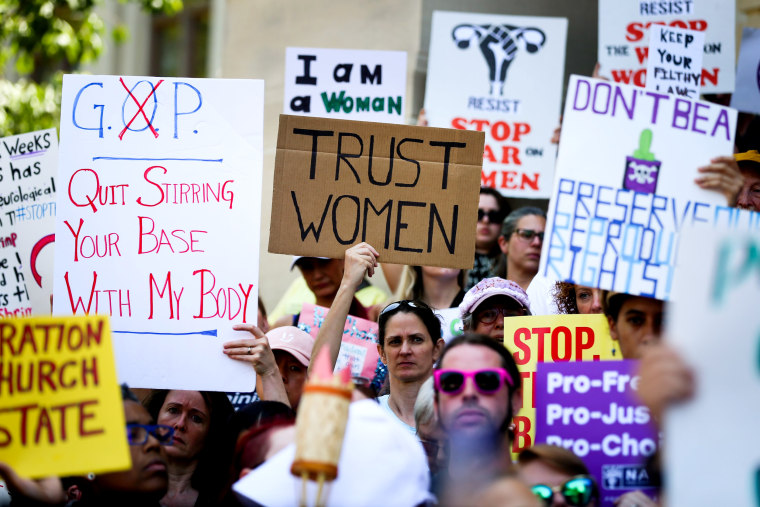Delta Air Lines is one of the largest employers in Georgia, but the airline’s chief executive said Tuesday the company will not take a stand on the state’s restrictive abortion law, which other corporate leaders have called “bad for business.”
Georgia’s law would ban women from having an abortion after a fetal heartbeat is detected, which typically happens after five to six weeks of pregnancy, a time when most women are just finding out that they’re pregnant.
"This is something that the courts need to settle and resolve, not corporate America. At least for us. I can't win,” Delta Air Lines Chief Executive Officer Ed Bastian said at Recode’s annual Code Conference in Scottsdale, Arizona.
Bastian’s comment comes after more than 170 CEOs, including Twitter and Square CEO Jack Dorsey, published a letter this week calling restrictive abortion laws “against our values” and “bad for business.”
Laws, such as the ones signed in Georgia and Alabama, inhibit “our ability to build diverse and inclusive workforce pipelines, recruit top talent across the states, and protect the well-being of all the people who keep our businesses thriving day in and day out,” read the full-page open letter published in Monday's New York Times.
Georgia’s law is expected to face a challenge in court before it can take effect in January.
Bastian said the reason Delta isn’t taking a stance is that it doesn’t want to alienate its employees or customers over “an issue that is uncomfortable.”
“We carry 200 million people a year, we have 80,000 employees. We cannot as a company take one group and put it over another group when you've got such an emotional — some would say almost religious — view as to what the right answer is," he said.
Netflix, Disney and WarnerMedia have all said they would reconsider filming in Georgia if the law ultimately takes effect. Bastian said their decision is different, since the companies are not headquartered in the state.
Last month, Alabama Gov. Kay Ivey signed a law that makes abortion a felony in most cases, unless the mother’s health is at risk. The law does not allow a victim of rape or incest to gain access to an abortion.
While Ivey’s controversial law is expected to be blocked in the courts, the governor said last month that she doesn’t expect any backlash to business or tourism. Alabama businesses have largely remained quiet on the issue, though it hasn’t been without controversy.
Hugh Culverhouse Jr., a real estate investor and lawyer who grew up in Alabama, said in an op-ed last week that the University of Alabama returned his $26.5 million gift after he called on prospective students to boycott the school over the ban.
The university claimed Culverhouse sent emails trying to influence decisions at the school, which he denied.
"Our decision was never about the issue of abortion," the school said in a statement. "The donor's continuing effort to rewrite history by injecting one of society's most emotional, divisive issues into the decision is especially distasteful."
When it comes to hot button issues, 47 percent of millennials believe CEOs have a social responsibility to speak up, according to a 2017 Weber Shandwick survey. About half as many GenXers and Baby Boomers agreed with the statement. A recent NBC/WSJ poll found that a record high of 71 percent of people still support the landmark Roe v. Wade Supreme Court case that legalized abortion.
However, some Americans said they would consider boycotting brands that speak out against the abortion laws — underscoring just how delicate this topic is for CEOs.
Stacey Abrams, the 2018 Democratic gubernatorial nominee in Georgia, said this week she met with Hollywood executives, show runners and actors to urge them to not boycott her home state.
While she doesn’t support the restrictive bill, Abrams urged businesses to #StayAndFight.
"Business relies on predictability — too many companies will face growing uncertainty in our health care environment. This forced pregnancy bill targets women but every Georgian is at risk if we lose doctors, jobs and billions," she said Tuesday.
